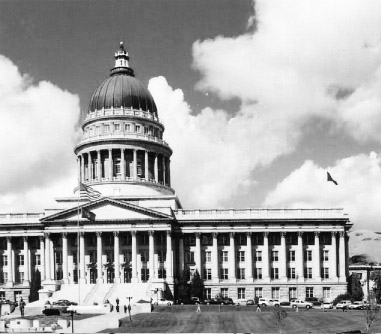Opposition to New Utah Tax Bill Starts Up a New Grassroots Movement

The Utah State Capitol. | Chronicle archives.
January 18, 2020
Local citizens are collecting signatures to get the recent tax reform bill on the ballot for the November 2020 election.
Krista Palmer, executive director of the Utah Tax Reform Coalition, said this would simply allow people to learn more about the bill and vote on whether or not they want it.
“If it is good for Utah, it will stand the test of time,” she said.
They must collect signatures from 8% of the total number of active voters in at least 15 of the 29 counties, and it must be submitted within 30 days of the first signature or before Feb. 15.
A private Facebook page of over 22,000 members is dedicated to setting up places around the state where people volunteer to help collect signatures.
Harmon’s grocery stores are allowing volunteers to set up in their stores and providing packets to collect signatures. People have tabled at other locations, including the Salt Lake Public Library and local coffee shops. Volunteers have also gone door-to-door in local neighborhoods to collect support.
“The movement is grassroots and widespread,” Palmer said.
The tax bill, SB-2001, which was passed in a special session of the Utah legislature on Dec. 12, would lower income taxes statewide, but raise taxes on gas, food and other services. On food, the tax would increase from 1.75% to 4.85%.
Palmer said she believes the legislature passed the bill at this time on purpose to make it difficult to pass a referendum.
Additionally, Palmer said the bill is highly regressive, will hurt poor people, and is not what the people of Utah want.
“The people of the state of Utah feel like they are without representative government,” she said.
The bill would additionally create a credit system called earned income tax credit, which would be “calculated off the amount provided in the federal earned income tax credit, and provides 10% of that total amount to qualifying individuals and families,” according to an FAQ published by Gov. Gary Herbert. Herbert believes it will incentivize work efforts and help to stop intergenerational poverty.
On the other hand, James Tobler, president of the Salt Lake Teacher Education Association, said the bill is extremely problematic and would hurt working-class families.
Palmer said she does not trust this system because it is contingent on people having both knowledge of the system and the ability to figure out how to file to receive credit.
Additionally, the Utah Constitution states all income tax is to be used for public and higher education. However, the food tax will shift into a general fund, which is then distributed based on the decision of lawmakers.
Tobler said this is concerning, and he worried the ultimate danger of this shift would be privatization of education.“Distribution of money depends on the whim of the legislature, and that is the problem,” he said.
Tobler said the Legislature has a poor record on supporting education, and he does not trust that lawmakers will work for the benefit of public schools. He believes that there is enough support to pass the referendum. His main concern is whether or not there will be enough resources and people collecting signatures to get there.
“It’s not without a lot of work, but I do believe that the referendum will pass,” Palmer said.







